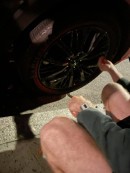The "Tire Extinguishers" (or "Tyre Extinguishers" if you speak British English) is a leaderless movement that appeared last year as a response to a spike in crossover, SUV, and pickup truck ownership. Their way of protesting? Deflating tires. Most car buyers dislike them, to say the least. But they might have a valid point, according to this new report.
There's no denying that new car shoppers prefer high-riding vehicles nowadays. One of the most popular automobiles is the Tesla Model Y, a crossover SUV.
But you don't have to believe the American EV maker's sales numbers. Ford is one of the most well-known carmakers in the world. It dropped all the sedans it used to make except for the iconic Mustang.
Another good example is newcomer Lucid. People thought it would go bankrupt because it only sells an all-electric sedan. Although mighty capable and available in many versions, it wasn't until the Gravity SUV was officially introduced that the company received a new lease on life.
Fisker is yet another startup that joined the automotive world with a battery-electric crossover SUV.
New car shoppers simply like larger, high-riding vehicles better than sedans, wagons, or hatchbacks. It's a reality that anyone must face. And that landscape change also brings challenges. Some people who are not very fond of cars want people to give up on buying these types of autos.
The "Tire Extinguishers" are disliked by car owners because their way of spreading the word about the dangers posed by generously sized vehicles consists of deflating tires. That can ruin anyone's morning and can even lead to unwanted spending. Most SUVs are heavy, and the sidewalls of their tires might not be able to withstand the narrow rim.
The activists claim they defend themselves "against climate change, air pollution and unsafe drivers." They also say that SUVs contribute disproportionately to air pollution, are a climate disaster, pose a danger to drivers of smaller vehicles, cyclists, and pedestrians, and are unnecessary.
A new report confirms that the activists are right about at least one thing – polluting the world. The Global Fuel Economy Initiative says that heavier and bigger vehicles considerably slowed down automakers' efforts to bring more fuel-efficient and cleaner vehicles to market.
An organization representative says we need to give up on SUVs if we want to lower transport emissions. That will be a challenge, considering over 51% of the new car market comprises SUVs.
The Global Fuel Economy Initiative also points out that the shift to larger vehicles has damaged climate, energy security, and diversification progress. Energy demand and CO2 emissions could have fallen by over 30% between 2010-2022 if vehicles had stayed the same size.
As such, the eco-warriors were right about SUVs being an environmental issue. Maybe EVs becoming more mainstream at an international level will change that.
But you don't have to believe the American EV maker's sales numbers. Ford is one of the most well-known carmakers in the world. It dropped all the sedans it used to make except for the iconic Mustang.
Another good example is newcomer Lucid. People thought it would go bankrupt because it only sells an all-electric sedan. Although mighty capable and available in many versions, it wasn't until the Gravity SUV was officially introduced that the company received a new lease on life.
Fisker is yet another startup that joined the automotive world with a battery-electric crossover SUV.
New car shoppers simply like larger, high-riding vehicles better than sedans, wagons, or hatchbacks. It's a reality that anyone must face. And that landscape change also brings challenges. Some people who are not very fond of cars want people to give up on buying these types of autos.
The "Tire Extinguishers" are disliked by car owners because their way of spreading the word about the dangers posed by generously sized vehicles consists of deflating tires. That can ruin anyone's morning and can even lead to unwanted spending. Most SUVs are heavy, and the sidewalls of their tires might not be able to withstand the narrow rim.
The activists claim they defend themselves "against climate change, air pollution and unsafe drivers." They also say that SUVs contribute disproportionately to air pollution, are a climate disaster, pose a danger to drivers of smaller vehicles, cyclists, and pedestrians, and are unnecessary.
A new report confirms that the activists are right about at least one thing – polluting the world. The Global Fuel Economy Initiative says that heavier and bigger vehicles considerably slowed down automakers' efforts to bring more fuel-efficient and cleaner vehicles to market.
An organization representative says we need to give up on SUVs if we want to lower transport emissions. That will be a challenge, considering over 51% of the new car market comprises SUVs.
The Global Fuel Economy Initiative also points out that the shift to larger vehicles has damaged climate, energy security, and diversification progress. Energy demand and CO2 emissions could have fallen by over 30% between 2010-2022 if vehicles had stayed the same size.
As such, the eco-warriors were right about SUVs being an environmental issue. Maybe EVs becoming more mainstream at an international level will change that.














